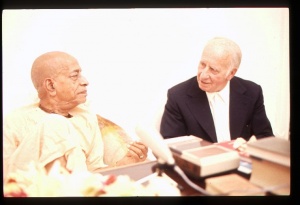SB 9.14.15-16

A.C. Bhaktivedanta Swami Prabhupada
TEXTS 15-16
- tataḥ purūravā jajñe
- ilāyāṁ ya udāhṛtaḥ
- tasya rūpa-guṇaudārya-
- śīla-draviṇa-vikramān
- śrutvorvaśīndra-bhavane
- gīyamānān surarṣiṇā
- tad-antikam upeyāya
- devī smara-śarārditā
SYNONYMS
tataḥ—from him (Budha); purūravāḥ—the son named Purūravā; jajñe—was born; ilāyām—in the womb of Ilā; yaḥ—one who; udāhṛtaḥ—has already been described (in the beginning of the Ninth Canto); tasya—his (Purūravā's); rūpa—beauty; guṇa—qualities; audārya—magnanimity; śīla—behavior; draviṇa—wealth; vikramān—power; śrutvā—by hearing; urvaśī—the celestial woman named Urvaśī; indra-bhavane—in the court of King Indra; gīyamānān—when they were being described; sura-ṛṣiṇā—by Nārada; tat-antikam—near him; upeyāya—approached; devī—Urvaśī; smara-śara—by the arrows of Cupid; arditā—being stricken.
TRANSLATION
Thereafter, from Budha, through the womb of Ilā, a son was born named Purūravā, who was described in the beginning of the Ninth Canto. When his beauty, personal qualities, magnanimity, behavior, wealth and power were described by Nārada in the court of Lord Indra, the celestial woman Urvaśī was attracted to him. Pierced by the arrow of Cupid, she thus approached him.